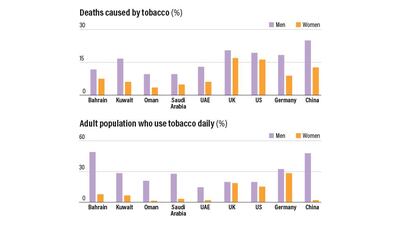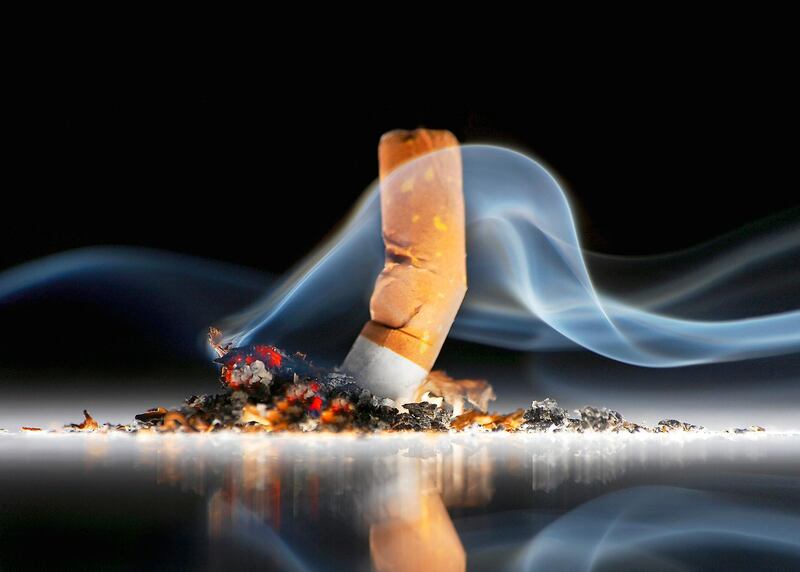Smoking killed more than 2,900 people in the UAE in 2016 and cost the country $569 million in lost productivity and health care costs, according to the latest report on global smoking.
The vast majority of the victims – 2,718 – were men, but 265 women also died as a result of smoking.
The stark statistics have been disclosed in the latest edition of The Tobacco Atlas report that maps the global impact of the addictive habit.
“Every death from tobacco is preventable, and every government has the power reduce the human and economic toll of the tobacco epidemic,” said Jeffrey Drope, co-editor and author of the report published by global public-health think-tank Vital Strategies and the American Cancer Society.
“It starts by resisting the influence of the industry and implementing proven tobacco control policies."
Health care professionals running cessation clinics in the UAE have said younger people are asking for help to quit.
They’ve also warned that medwakh, a traditional Arabic smoking pipe, is also increasing in popularity and could contribute to more related deaths in future.
According to the sixth edition of The Tobacco Atlas, launched at the World Conference on Tobacco or Health in Cape Town, more than 900,000 adults in the Emirates use tobacco every day.
Smoking is responsible for one in eight deaths among men in the UAE.

While just over 14 per cent of men in the UAE smoke – a smaller proportion than in all other GCC countries – more than a quarter of men smoke in Saudi Arabia and almost half in Bahrain.
In the top five European economies – Germany, the UK, France, Italy and Spain – an average of 28 per cent of men smoke.
The percentage of women who smoke in the UAE (1.9 per cent) and the GCC as a whole (3.8 per cent) is far lower than in Europe, 24 per cent among the top five nations.
“In the last year I’ve seen the people coming to the smoking cessation clinic are a lot younger than in the US, with an average age of 40, rather than 50,” said Iyaad Hasan, director for advanced practice providers at the Cleveland Clinic, Abu Dhabi.
“A lot more people in their 20s actually want to quit, and are becoming more health conscious.
“I have noticed a lot more medwakh use here than what has been previously reported.
“Close to 40 per cent of my patients are medwakh smokers – but they are also motivated to quit.
“Most of the Nice guidelines and US guidelines reference cigarettes, shisha or smokeless tobacco – but there are few guidelines on medwakh usage but we know it is very addictive.
“It is a much stronger smoke, and it has a stronger psychological involvement so the counselling needs to be culturally sensitive.
“We are not trying to break a cultural tradition; we are trying to improve someone’s health.”
________________
Read more:
More enforcement needed to curb smoking in UAE, say experts
UAE excise tax encourages more smokers to try to quit in 2018
UAE doctors stand firm over e-cigarettes despite UK backing
_________________
According to the atlas, 13.5 per cent of men and 23 per cent of women in the UAE who use tobacco do so via a water pipe, or shisha.
The report cites research undertaken in 2010-11 and said tobacco users who think they are protecting their health by using water pipes rather than smoking are fooling themselves.
This idea “is rooted in wilful ongoing misinformation that hookah water can magically clean up tobacco smoke”, the authors said.
“Nothing could be further from the truth. A single puff from a water pipe is nearly equal to the volume of smoke inhaled from an entire cigarette and water-pipe smoking has been associated with elevated risks of lung, lip, mouth, and oesophageal cancers.”
Governments must be “comprehensive and forceful in their smoke-free policies”, urges the report and cites the UAE for moves to include water pipes in smoking bans.
Municipalities must now include visual information on the damage done by smoking water pipes, clearly displayed in shisha cafes.
A tobacco tax drafted in late in 2017 has also been welcomed as an indicator of positive action to reduce the amount of people smoking in the UAE.
The price of cigarettes doubled from October following the 100 per cent tax on tobacco products.
The UAE scores highly on the World Health Organisation Cessation Index – a measure of state initiatives designed to help people quit smoking, due to its bans on tobacco advertising on TV and billboards and in magazines, newspapers and sponsorship.
Anti-tobacco health campaigns, graphic warnings on packaging and investment in a national quitting hotline and cessation services were also praised.
The report’s authors say smoke-free zones in public buildings should be extended to include all public spaces.
E-cigarettes remain banned from sale in the UAE, a stance supported by many doctors due to the lack of reliable research on their effectiveness as a safer alternative – despite their backing by health authorities elsewhere, such as the UK.
“We are still doing the research in e-cigarettes, and there is evidence to support both sides for and against using them as a cessation aid,” said Mr Hasan.
“They may have less chemicals than regular cigarettes but they still have chemicals like formaldehyde and antifreeze that we know are dangerous.”
The report said tobacco taxes are “the most effective but the least-used tobacco-control tool”.
WHO says that at least 70 per cent of the retail price of cigarettes should be made up of tax, to price more smokers out of the market and encourage them to quit.
On average, a 10 per cent increase in prices cuts the consumption of cigarettes by between 2-8 per cents, the report said.
At just $5.33 for a pack of 20 of the most-sold brand, the UAE has the cheapest cigarettes in the GCC, followed by Qatar ($5.87), Kuwait ($6.76), Oman ($7.52), Bahrain ($8.33) and Saudi Arabia ($8.69).
Consuming at least 70 carcinogens with every puff, the typical smoker will give up a decade of their life for their habit and half of all smokers die from tobacco-related illnesses.
In 2016, tobacco costed the lives of over seven million people – five million men and two million women.
And smokers aren’t only harming themselves, with more than over 12 per cent of these deaths (884,000) attributed to second-hand smoke.
The financial burden, in lost productivity and health care costs, was $2 trillion, or 2 per cent of the world’s total economic output.
The combined revenues of the world's six largest tobacco companies in 2016, meanwhile, was more than $346 billion – almost the same as the Gross National Income of the UAE.
This, says The Tobacco Atlas, is equivalent to $9,730 for the death of each smoker, an increase of 39 per cent since 2015.
“Tobacco causes harm at every stage of its life cycle, from cultivation to disposal,” said Dr Neil Schluger, senior adviser for science at Vital Strategies and co-editor and author of the atlas.
The most common smoking related condition treated in the UAE are chronic obstructive pulmonary disease, lung cancer and smoking related Interstitial lung disease.
“I would have expected these UAE deaths to be much higher,” said Dr Sukhant Bagdia, a specialist pulmonologist at NMC Hospital, Dubai.
“Every second person coming to my clinic is smoking tobacco or having tobacco in another form.
"Tobacco usage has not been affected by recent tobacco tax in the majority of my patients, because they have a serious physical dependence."
The report estimates that the burden of rubbish generated by smokers in the UAE amounts to “2,801 tonnes of butts and packs thrown away every year – equivalent to the weight of 560 elephants”.
Quitting tobacco has significant immediate and long-term benefits, regardless of age.
Former smokers who stop smoking by about 40 years old reduce their risk of dying from lung cancer by 90 per cent.
Even someone who starts smoking as an adult and quits at the age of 22 is one and a half times more likely to die before 65 than someone who has never smoked.
Quit at 40 and your risk is over three times as high, at 50 it’s six times higher and, if you never stop, you are 24 times more likely to die before you’re 65.






